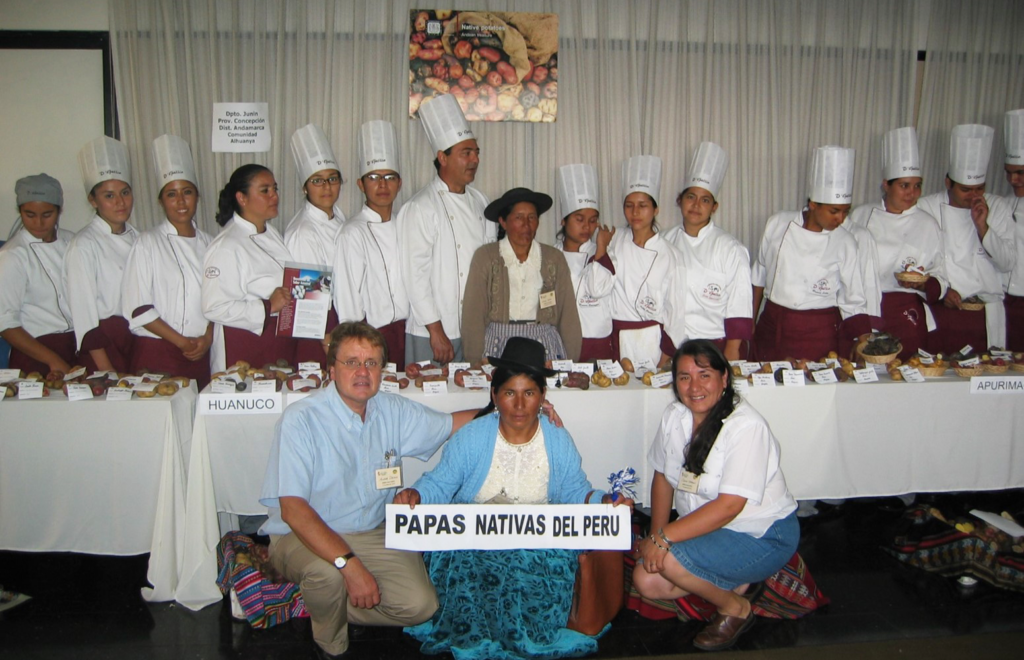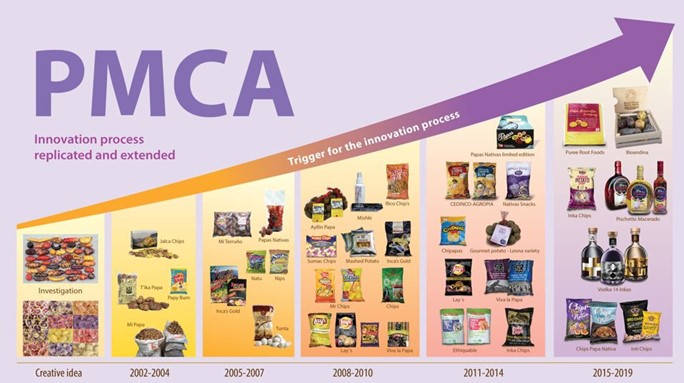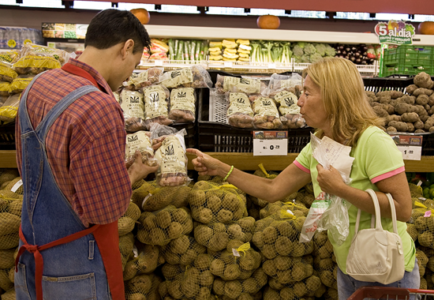A recent study from the International Potato Center explores the impact and outcomes of the Participatory Market Chain Approach (PMCA) in stimulating market innovation and development of diverse value chains around the world.
Originally used in the Andes in the 2000s, PMCA triggered innovation processes in Peru that led to impressive product development and market sales for several native potato varieties that were largely unknown among consumers. The virtue of PMCA is that it works directly with stakeholders to understand and learn the needs and challenges of all actors along a value chain, from farmers to sellers and from marketers to families.
For the research, the authors studied eight well-documented cases where PMCA had been used in different settings and value chains in sub-Saharan Africa, Asia, Central Europe, and Latin America. They found that PMCA performed best in favorable policy environments and where the value chain offered significant potential for value addition and had been implemented following its basic principles and as part of a larger development effort. The team concluded that using participatory systems approaches like PMCA can help R&D organizations respond better to market demands.
The lead author Doug Horton notes, “By systematically tracking use over nearly two decades, we were pleasantly surprised to learn that the PMCA has since been used in value chains for more than 20 agricultural commodities in Africa, Asia, Eastern Europe and Latin America!”
Efforts to develop this novel use of collective action for value chains began as part of the CIP-led Papa Andina regional program. In this program, PMCA helped forge links between smallholder farmers and other value chain actors, and tap high-value niche markets for fresh and processed products based on largely under-valued and under-exploited native Andean potato varieties.
Targeting urban and subsequently export markets, PMCA gained traction in Peru and the number of its beneficiaries increased rapidly to more than 100,000 smallholder farmers and market agents, with dozens of gourmet native potato-based products developed in the process. These products include uniquely-colored native potato chips, an Andean instant mashed potato, and T’ikapapa gourmet potatoes, which went on to win both the “World Challenge Award“ and the “Promoting Entrepreneurship for Sustainable Development (SEED) Initiative” in 2007.

Successful PMCA relies heavily on collaboration with development partners at all levels. André Devaux, a co-author of the study, says, “A critical component is the active involvement of a wide range of value chain actors, including small-scale producers, commercial entrepreneurs and relevant service providers to build trust and promote mutual learning to stimulate innovation across the value chain. We do that with a clear focus on joint market opportunities and through group meetings and public events that engage a progressively broader group of stakeholders in co-innovation.”
Once partnerships are established, CIP facilitates the process, helping stakeholders to identify business innovations and provide technical support where needed to improve production and marketing. This work can take many forms, for example, by improving pest and disease management, pin-pointing suitable varieties and systems for improving seed quality, and providing assistance to develop new packaging, labelling and branding in the marketplace.

PMCA is particularly effective at targeting vulnerable groups to ensure they share in the success. “Applying PMCA to value chains has helped women and youth participate in and benefit from agricultural marketing. The opportunity to engage with other value chain actors in joint business development is helping women register and expand their vegetable seed enterprises in Central Uganda,” said Sarah Mayanja, a research associate with CIP based in Uganda.

With adjustments to fit local contexts, PMCA has also been used to strengthen potato value chains in West Java, Indonesia; domestic coffee markets in San Martin, Peru; and many regional products in Albania, including herbs, spices, nuts, mushrooms and olive oil. Meanwhile, in Bangladesh and Nepal, a PMCA initiative with WorldFish and local organizations has increased sales for fish farmers, hatcheries and nursery owners, traders, and suppliers of feed, fertilizer and aqua-medicines. Forty percent of the people in these groups are women.
Though the team is pleased with the results highlighted in the study, RTB Director, Graham Thiele, believes there is more potential to fulfill: “The outcomes could have been greater if we had thought through an efficient scaling strategy to promote broader use of the PMCA. Proper scaling of innovations, like PMCA, is an effective solution to the perennial challenge of embedding participatory systems approaches in agricultural research and development organizations.”
Note: This is an update of a blog originally posted in August 2020 on the websites of CGIAR Research Programs on Roots, Tubers and Bananas and Policies, Institutions and Markets. The authors gratefully recognize the funding provided by the Swiss Agency for Development and Cooperation and the United Kingdom’s Department for International Development (today known as the Foreign, Commonwealth and Development Office) for the original applications of PMCA.
